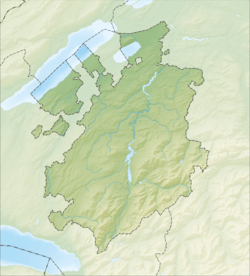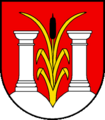Sâles, Fribourg facts for kids
Quick facts for kids
Sâles
|
||
|---|---|---|
|
||
| Country | Switzerland | |
| Canton | Fribourg | |
| District | Gruyère | |
| Area | ||
| • Total | 18.82 km2 (7.27 sq mi) | |
| Elevation | 825 m (2,707 ft) | |
| Population
(Dec 2020 )
|
||
| • Total | 1,452 | |
| • Density | 77.15/km2 (199.82/sq mi) | |
| Postal code |
1625
|
|
| Localities | Maules, Romanens, Rueyres-Treyfayes, Sâles | |
| Surrounded by | Grangettes, La Verrerie, Marsens, Riaz, Semsales, Vaulruz, Vuisternens-devant-Romont | |
Sâles (pronounced "sahl") is a town in Switzerland. It is located in the Gruyère area of the Fribourg region. In 2001, Sâles became one larger town when four smaller villages joined together. These villages were Maules, Romanens, Rueyres-Treyfayes, and Sâles (Gruyère).
Contents
What is Sâles Like?
Sâles covers an area of about 18.8 square kilometers (about 7.2 square miles). Most of this land, around 72.7%, is used for farming. Forests cover another 20.2% of the area. The rest of the land, about 6.1%, has buildings and roads. A small part, 1.0%, is land that cannot be used for farming or building.
In the built-up areas, 2.7% is for homes and buildings, and 2.8% is for roads. The forests include thick woods (18.6% of the total land) and smaller groups of trees or orchards (1.6%). For farming, 14.6% of the land grows crops, and 56.6% is used for pastures where animals graze.
Sâles is part of the Gruyère district. It includes the villages of Maules, Romanens, Rueyres-Treyfayes, and Sâles (Gruyère), which all merged in 2001.
Town Symbol: The Coat of Arms
The official symbol of Sâles is its coat of arms. It shows a red shield with two silver columns. These columns rise from two silver hills. Between the columns, there is a golden bulrush plant with black seeds.
People of Sâles
Sâles has a population of about 1,360 people (as of 2023). About 5.2% of the people living in Sâles are from other countries (as of 2008). Over ten years (from 2000 to 2010), the number of people in Sâles grew by 15.8%. Most of this growth was from people moving into the town.
Most people in Sâles (about 95.4%) speak French as their main language. A smaller number speak German (1.9%) or Portuguese (1.7%).
As of 2008, about 49.7% of the population was male, and 50.3% was female. Most people in Sâles were born in Switzerland. About 42.4% were born in Sâles itself, and 41.8% were born in the same region (canton).
In 2000, children and teenagers (ages 0-19) made up 31.2% of the population. Adults (ages 20-64) made up 54%, and seniors (over 64) made up 14.9%.
What People Do in Sâles
In 2010, the unemployment rate in Sâles was low, at 1.3%. This means most people who wanted to work had jobs.
Many people in Sâles work in farming. In 2008, about 156 people worked in the farming sector, with 60 businesses related to agriculture. Another 239 people worked in the manufacturing and construction sectors, with 21 businesses. About 168 people worked in the service sector, which includes things like shops, restaurants, and healthcare, with 20 businesses.
In 2008, there were 484 full-time jobs in Sâles. Most of these jobs were in agriculture (127 jobs) and manufacturing (187 jobs). In the service sector, jobs included sales, hotels, restaurants, and healthcare.
Some people who live in Sâles travel to other towns for work. In 2000, 141 workers came into Sâles for jobs, while 153 Sâles residents traveled to work elsewhere. Most people (57.5%) used a private car to get to work, while 6.7% used public transportation.
Beliefs and Religions
Based on a 2000 survey, most people in Sâles (88.6%) are Roman Catholic. About 3.2% belong to the Swiss Reformed Church. There were also people who followed Islam (3.74%) and Buddhism (a small number). About 2.89% of the people did not belong to any church or had no specific religious belief.
Learning and Schools
In Sâles, about 26.7% of the people have finished high school. About 7.3% have gone on to get a higher education from a university or a specialized college.
The schools in the Fribourg region follow a specific system:
- One year of optional Kindergarten.
- Six years of Primary school.
- Three years of required lower secondary school, where students are grouped by their abilities.
- After lower secondary, students can choose to go to a three or four-year upper secondary school. This can be a gymnasium (which prepares students for university) or a vocational program (which teaches job skills).
- After upper secondary, students can go to a higher education school or continue with an apprenticeship (learning a trade on the job).
During the 2010-2011 school year, 131 students attended 7 classes in Sâles. A total of 295 students from Sâles went to school, either in Sâles or in nearby towns.
Interesting Places to See
The small village of Rueyres-Treyfayes, which is part of Sâles, is a special place. It is listed as part of the Inventory of Swiss Heritage Sites. This means it has important historical or cultural value and is protected.
Images for kids
See also
 In Spanish: Sâles para niños
In Spanish: Sâles para niños





